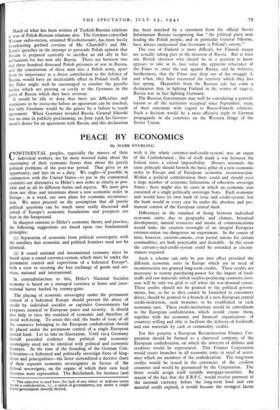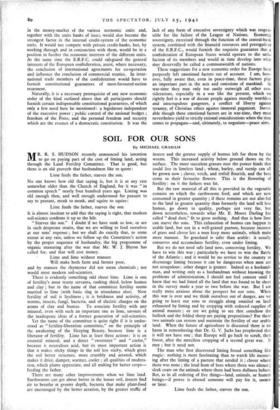PEACE BY ECONOMICS
By MARK STERLING
CONTINENTAL peoples, especially the masses of their individual workers, are far more worried today about the uncertainty of their economic future than about the purely political problems of the post-war period. That gives us an opportunity, and lays on us a duty. We ought—if possible in conjunction with the United States—to put to the continental countries our alternative to Hitler's new order as clearly as pos- sible and in all its different forms and aspects. We must give them our ideas and intentions about a new economic order in Europe ; in a word, our own plans for economic reconstruc- tion. We must proceed on the assumption that all purely political questions can be much more easily discussed and solved if Europe's economic foundations and prospects are kept in the foreground.
In sharpest contrast to Hitler's economic theory and practice, the following suggestions are based upon two fundamental principles: (i) Separation of economic from political sovereignty, with the corollary that economic and political frontiers need not be identical.
(2) A sound national and international economy must be based upon a sound currency-system, which must be under the permanent control and supervision of a federated Europe*, with a view to securing the free exchange of goods and ser- vices, national and international.
In contradistinction to this, Hitler's National Socialist economy is based on a managed currency at home and inter- national barter backed by tommy-guns.
The placing of economic sovereignty under the permanent control of a federated Europe should prevent the abuse of credit by individual socialist or capitalist Governments for purposes inimical to European peace and security. It should also help to raise the standard of economic and therefore of social well-being. To attain this end, the banks of issue of all the countries belonging to the European confederation should be placed under the permanent control of a single European central bank. Let us take an illustration. Until 1914 Germany herself provided evidence that political and economic sovereignty need not be identical with political and economic frontiers. At the time of the founding of the German Con- federation—a federated and politically sovereign State of king- doms and principalities—the latter surrendered a decisive share of their separate economic sovereignties in favour of the federal sovereignty, on the organs of which their own local interests were represented. The Reichsbank, for instance (and * The adjective is used here (for lack of any other) to indicate union under a confederation, i.e., a union of governments, not under a single super-government directly elected. with it the whole currency-and-credit-system) was an organ of the Confederation ; this of itself made a war between the federal states a virtual impossibility. Mutatis rnutandis the same principle should furnish the basic pillar of a new economic order in Europe and of European economic reconstruction. Within a political confederation there could and should exist a large number of economic federations of otheiwise sovereign States ; there might also be cases in which an economic unit consisted of a single politically sovereign State. Each economic unit would have its own bank of issue and credit-system, but the bank would in every case be under the absolute and per- manent control of the European central bank.
Differences in the standard of living between individual economic units, due to geography and climate, historical development, natural resources and means of communications would make the creation overnight of an integral European customs-union too dangerous an experiment. In the course of time, however, customs-unions, even partial unions for certain commodities, are both practicable and desirable. In this event the currency-and-credit-system could be extended as circum- stances required.
Such a scheme can only be put into effect provided the different economic units in Europe which are in need of reconstruction are granted long-term credits. These credits are necessary to restore purchasing-power for the import of food- stuffs and raw materials which surplus-producing countries over- seas will be only too glad to sell when the war-demand ceases. These credits should not be granted to the political govern- ments, but, so far as they cannot be furnished to consumers direct, should be granted to a branch of a new European central credit-institution, such branches to be established in each economic unit. These credit-institutions would be subordinate to the European confederation, which would create them, together with the economic and financial organisations of countries willing and able to facilitate the delivery of foodstuffs and raw materials by cash or commodity credits.
For this purpose a European Reconstruction Finance Cor- poration should be formed as a chartered company of the European confederation, on which the interests of debtors and creditors would be represented. This Finance Corporation would create branches in all economic units in need of assist- ance which are members of the confederation. The long-term credits would be issued in the currencies of the creditor countries and would be guaranteed by the Corporation. The latter would assign itself suitable mortgage-securities. By reason of the fact that the E.R.F.C. would receive payment in the national currency before the long-term food and raw material credit expired, it would become the strongest factor in the money-market of the various economic units and, together with the units banks of issuz, would also become the strongest factor in the internal credit-system of the economic units. It would not compete with private credit-banks, but, by working through and in conjunction with them, would be in a position to further the economic interests of the different units. At the same time the E.R.F.C. could safeguard the general interests of the European confederation, assist, where necessary, the conclusion of international agreements for co-operation and influence the conclusion of commercial treaties. In inter- national trade members of the confederation would have to furnish constitutional guarantees of most-favoured-nation treatment.
Naturally, it is a necessary prerequisite of any new economic order of the kind outlined above that all participants should furnish certain indispensable constitutional guarantees, of which only a few need here be mentioned: a legislature independent of the executive power ; public control of the national budget ; freedom of the Press, and the personal freedom and security which are the essence of a democratic constitution: It was the lack of any form of executive sovereignty which was reap's- sible for the failure of the League of Nations. Economic sovereignty, exercised through the function of the central-bank system, combined with the financial resources and prerogatives of the E.R.F.C., would furnish the requisite guarantee that a confederation of European States would operate to the satis. faction of its members and would in time develop into what may deservedly be called a commonwealth of nations.
These suggestions for a new economic order for Europe have purposely left emotional factors out of account I am, how- ever, fully aware that, even in peace-time, these factors play an important part in the acts and omissions of mankind. In war-time they may only too easily outweigh all other con- siderations, especially in a war like the present, which we rightly feel is a war of decent people against morally worthless and unscrupulous gangsters, a conflict of liberty against tyranny, of Christian ethics against immoral paganism. Inevit, able though these emotional factors are in war-time, they must nevertheless yield to strictly rational considerations when the time comes to propagate—and, ultimately, to negotiate—peace aims.



























 Previous page
Previous page